- Home
- Conn Iggulden
The Field of Swords Page 36
The Field of Swords Read online
Page 36
Their king rode with them and long banners waved from spears set into his saddle. Julius watched from the wall as the Senones’ leader brandished his sword at the men in the fort, mocking them. Julius showed his teeth.
“Now, Brutus!” he called down.
The Senones could not see into the camp and their cheering continued unabated. Over the thunder of their own hooves, they did not hear the extraordinarii as they gathered at the far end and kicked their mounts into a gallop across the wide camp, straight at the wall near the gate.
As they gathered speed, fifty men of the Tenth used lengths of wood to break down the loose blocks that made up the wall. It fell away just as Julius had designed it to do, leaving an open space wide enough for five horses to ride abreast.
The extraordinarii came out like arrows, straight at the king. Before his riders could react, he was surrounded and dragged from his horse. The extraordinarii wheeled in the face of the enemy and galloped back inside the gap in the walls, with the king yelling across Brutus’s saddle.
Julius opened the gates and the Tenth marched out in triumph. The panic and fear they had pretended had vanished and they hit the milling Senones with a roar. The Tenth hammered them with spears and swords and forced the Gauls farther and farther away from the fort and their captured king. Behind them, the hole in the wall was filled with carts that had been left for that purpose and Julius leapt into his saddle to race after them, glancing back to see the fort made secure once more.
It had taken a moonless night to construct the false wall, but it could not have worked better. The king of the Senones had been crucial to their attacks, a man able to answer every stratagem with speed and intelligence. Removing him from the battle was a vital step in beating the tribe.
Julius cantered to the front line of the Tenth and saw their pleasure at his presence. The Ariminum legions were holding their position as they had been told, and now the Tenth could strike the rear of the Senones, smashing them between the two forces.
From the first instant of the Tenth reaching their lines, Julius could feel the difference in the shifting mass of riders and foot soldiers. They had relied too much on their king, and without him they were already close to panic.
Though they tried to detach in units as their king had ordered on previous days, the core of discipline had vanished. Instead of an orderly retreat for tactical advantage, two charges fouled each other as they tried to organize themselves. The Tenth smashed them down from their saddles and moved on. Riderless horses ran screaming around the battlefield and the Senones were crushed, hundreds of them throwing down their arms and surrendering as the news of the king’s capture spread.
Three miles away lay their largest town and Julius marched the Tenth toward it as soon as the warriors were disarmed and bound as slaves. The price for them would swell his coffers still further, and the town was known to be wealthy. After he paid his share to the Senate, he still hoped to have enough to increase his fleet and finally be able to cross the grim channel between Gaul and the islands. They had captured nine ships from the Veneti, but he would need another twenty galleys to take more than a scouting force to sea. One more year to build them and then he would take his best men to lands no Roman had ever seen before.
As the Tenth marched toward the Senones’ stronghold, Julius laughed aloud with the excitement of such a prospect, even as his mind filled with the thousand details of supply and administration that his men required to take the field. He was to meet with a delegation from three tribes along the coast in two days and expected them to bring tribute and a new treaty. With the Veneti fleet sunk or run aground, that whole part of the north had surrendered to him, and now that the Senones had been removed from the equation, a full half of Gaul was his. There were no tribes who hadn’t heard of the legions by then. Gaul was buzzing with the news of his conquests, and he rarely saw a day when their leaders didn’t travel to his camps and wait for his signature on a treaty. Adàn was kept busy and had been forced to take on three other scribes to handle the endless copying and translation.
Julius wondered what to do with the king he had captured. If he was left alive, Julius thought him capable of leading a rebellion in the years to come. The king’s own ability prevented mercy and Julius decided his fate without regret.
As the Senones’ town came into view, Julius looked with pleasure on it, already imagining the temples within. It was known that the Senones showed their love of the gods with coins and jewelry, forming rooms of treasure over many years. After the legion smiths had melted the precious metal down into bars and struck new coins, Julius would strip anything of value from every house and public building. He would leave the people alive and under the protection of the legions, but he needed their wealth to go on.
A cold wind touched him from across the plain, and Julius shivered at the first chill of another winter. He narrowed his eyes as he looked east, imagining the Alps and the distance that he would have to cross. For the first time, he would not be spending the cold months in Gaul. Instead, he would travel to Ariminum for a meeting to decide the future.
The letter from Crassus crackled against his skin as he rode, and Julius hoped he could still trust the promises of the old man. It was not the time to be recalled, with Gaul opening up before him. The islands over the sea haunted his dreams. There were still some who said they did not exist, but Julius had stood on the coastal cliffs and seen them shimmering whitely in the distance.
The Senones’ town surrendered and the gates were thrown open. Julius rode in under the arches, his mind already on Ariminum and the future.
CHAPTER 33
_____________________
The legion guards on Ariminum’s walls were well protected against the cold. As night fell, they pulled heavy cloaks over their armor and wrapped their faces in strips of cloth so that only a thin slit was left.
Fires were lit in braziers all along the stone crest, and the legionaries were allowed to huddle around them. Most of them were new recruits, brought up from the towns in the south to replace those fighting for Caesar in Gaul. They showed their youth in the muttered wisecracks and the illicit flask of spirits that made them gasp and choke and clap each other on the back.
The city of Ariminum was a working town and there were few lights in the windows as the winter night darkened. Before dawn, the streets would fill again with carts and produce for the ships. The tradesmen would grab a few hot mouthfuls for a bronze coin on their way to another day, and the legionaries on the walls would be relieved.
Against the backdrop of the silent city, one of the guards looked up and peered into the darkness.
“Thought I heard horses out there,” he said.
Two more left the warmth of their brazier to stand by him. They listened in perfect silence, and just before they turned away, they heard something. Noise seemed to carry farther in the strange stillness that comes from frozen ground.
The youngest guard narrowed his eyes and moved his head back and forth. There was nothing but gloom outside the walls, yet he could have sworn the darkness shifted whenever he set his eyes on it.
The shadows coalesced into sharper shapes and the young legionary stiffened, pointing.
“There! Riders . . . can’t tell how many.”
The others lacked his keen eyesight and could only stare where he pointed.
“Are they ours?” one of them said, hiding his fear. His mind was filled with the image of barbarian tribesmen storming their city walls, and the cold seemed to intensify as he shuddered.
“I can’t tell. Should we fetch Old Snapper?”
The question made the three young soldiers pause. The possibility of raiders was one thing, but rousing their centurion for a false alarm was simply asking for trouble.
Teras was the eldest of them. He had no more experience than the others, having joined up later in life after failing to make his way as a merchant. Yet they looked to him as they had learned to do in matters of money and young women. H
e didn’t know a great deal about either, but affected an air of worldly wisdom that had impressed the younger recruits.
While they hesitated, the force of riders came closer and the metallic noise of harness was mingled with the steady tread of marching men. The night wind snapped at long pennants that rippled unpleasantly as the dark figures advanced toward the gate.
“All right, go and get him,” Teras said, biting his lip in worry.
“Approaching the gate!” a voice shouted below them. The guards stood to stiff attention as they had been trained.
“We’re closed. Come back in the morning,” one of the other sentries called, his companions stifling laughter.
There was one who should have been searched for drink before coming on watch, Teras thought bitterly. He could have hit the young fool in frustration, but the words had been spoken. Teras closed his eyes as he waited through a pregnant silence below.
“I will find whoever said that and kick his backside into bloody tatters,” the same voice replied, halfway between amusement and anger. “Now open the gate.”
Teras turned to the men on the locking bar below. There were times when he wished he’d stayed a merchant, despite losing more money than he’d ever earned.
“Open it,” he said. The young men below looked up with worried expressions.
“Shouldn’t we wait for—”
“Oh, just open it. It’s cold and they are Romans. If they were barbarians, do you really think they would be waiting for us to finish our argument?”
By the end, his voice had risen to a shout and the anger seemed to get through to them as nothing else could. The heavy locking bars were heaved away and the gate pulled smartly open.
Brutus rode through first and dismounted, handing the reins of his horse to the nearest guard.
“Right. Now where’s that cheeky bastard on the wall?”
Teras saw another rider come through the gate, as heavily muffled as the guards above. He was an imposing figure nonetheless and Teras could see how the men behind him waited patiently for him to move through the gate. An officer; Teras could spot them a mile away.
“We don’t have time,” the man said clearly. “I’m late enough as it is.”
With a quick nod, Brutus threw a leg over his horse and heaved himself back into the saddle. The officer didn’t wait for him, but kicked in his heels and trotted on through the dark streets, the rest following without a word.
Teras counted a full century by the time Snapper came climbing up to the wall beside him. The gate was securely fastened once again and the young guards resumed their positions, not daring to catch their centurion’s eye.
Snapper was a veteran and if you believed all the stories the men told about him, he had been part of every major battle since the days of Carthage. Despite the fact that it would have made him centuries old, he would talk of those times as if he had been there personally, with a clear implication that only his presence had saved the Republic from invaders, poor discipline, and, possibly, pestilence. Whatever the truth was, he was scarred, bad tempered, and deeply resentful of being given green recruits to turn into something approaching legionaries.
“You, you, and . . . you,” the old soldier said grimly, pointing last to Teras. “I don’t know what you think you were doing tonight, but tomorrow you will be digging out the shithouse on Famena Road. That I do know.”
Without another word, Snapper stomped down the slippery steps, still swearing under his breath. Teras could smell the sweetness of the alcohol on his breath for some time after he had gone.
The young legionary who had called out to Brutus shuffled over as Teras resumed his post by the brazier, warming his hands. He opened his mouth to say something.
“Don’t,” Teras said grimly. “Or I’ll kill you myself.”
Julius found the meeting place without too much difficulty. The cryptic message from Crassus had asked him to remember where they had once planned the defeat of Spartacus. Though Julius had not seen Ariminum for a decade, the city was simply laid out and the house was the only one showing a light in an empty street near the docks. He had tried for secrecy as far as possible, leaving Gaul without warning to fly ahead of informers and making the best speed he could with a century of the Tenth. They had covered the first sixty miles in a little over twelve hours, and not once had the men complained or asked to rest longer than the short stops for food and water. When he was sure that even the fleetest of spies must be behind them, Julius had allowed a slower pace over the Alp passes, and in truth, they could not have gone much faster in the bitter cold and thin air. By the time they had completed their descent, Julius was certain that anyone who followed would have to wait until spring.
Julius left Brutus with the century to block the road. He strode up to the doorway he remembered from the old campaign and knocked on the timbers, pulling his cloak tightly around himself against the cold.
A man he did not know opened it and Julius wondered if he was the owner of the house.
“Yes?” the man said, looking blankly at Julius.
“Gaul,” Julius replied, and the man stood back for him to enter.
Julius could hear the crackle and snap of a large wood fire before he entered the room. Pompey and Crassus rose to greet him and Julius felt a wave of affection for both of them as he clasped hands. They too seemed to feel it and the smiles were genuine.
“It’s been a long time, my friend. Did you bring my son?” Crassus said.
“As you asked me to, yes. Shall I have him brought in?”
Julius watched Crassus struggle for a moment before replying.
“No, not until we have spoken,” he said reluctantly. “There’s food on the table and hot wine by the fire. Come and sit down and warm yourself.”
With a stab of guilt, Julius thought of his men shivering in the night outside. Crassus had asked for privacy for their meeting, but they would still need to find food and shelter before morning. He wondered how many men could be packed into the rambling Ariminum house or whether they would end up sleeping in stables.
“Have you been in the city for long?” Julius asked. Both men shook their heads.
“Just a few days,” Crassus replied. “Much longer and I would have had to return to Rome. I’m glad you came.”
“How could I not after that mysterious note? Passwords and night marches across the north. All very exciting.” Julius smiled at the older men. “In truth, I am glad to be here rather than in Gaul in winter. You have no idea how bitter it is in the dark months.”
The two former consuls exchanged glances and Julius saw that much of the friction between them had eased over time. He waited patiently for them to broach the reason for the meeting, though now he was actually with them, neither man seemed sure how to begin. Julius chewed on a piece of cold lamb as he waited.
“You remember our agreement?” Pompey said at last.
Julius nodded. “Of course. You have both honored it, as I have.”
Pompey grunted agreement. “But time has moved on. We must review the terms,” he said.
“I assumed as much,” Julius replied. “There are new consuls now and you are wondering if there is still profit to be had from me. Tell me what you need.”
Crassus gave out a dry chuckle. “Always so direct, Julius. Very well. The Senate has changed a great deal in the years you have been away.”
“I know it,” Julius replied and Crassus smiled.
“Yes, I’m sure you have your own sources. There is talk of recalling you from Gaul, you know. Your attacks over the Rhine did you no favors with the senators. The Germanic tribes were never part of your orders and Pompey was hard-pressed to protect you.”
Julius shrugged. “Then you have my thanks. I considered it necessary to hold the Rhine border there.”
Pompey leaned forward on his chair and warmed his hands against the flames. “You know how fickle they are, Julius. One year they are cheering you and the next calling for your head. It has always be
en that way.”
“Will you be able to prevent the recall?” Julius asked, holding himself absolutely still. Much depended on the answer.
“That is why we are here, Julius,” Pompey replied. “You want to have your time in Gaul extended, and I can give you that.”
“There was no talk of limits when I first set off,” Julius reminded him.
Pompey frowned. “But now the situation has changed. You are no longer consul and none of us can stand again for years to come. There are too many new men in the Senate who know you only as a general somewhere impossibly distant. They look for some end to your reports, Julius.”
Julius looked calmly at him without replying.
Pompey snorted. “You left the north bare when you took the legions at Ariminum. That cost you a great deal of support and we’re hardly up to strength even now. Your debtors pursue you through the Senate. There is even talk of bringing a trial against you for killing Ariovistus. All of these things would require you to give up your command and return home.”
“So the price for me staying will be what? My daughter is already promised to you,” Julius said softly.
Pompey forced a smile onto his face and Julius could see how tired he was. Crassus spoke first.
“You understand, Julius. I am glad. For me, the price of my support is the return of my son to lead my legion. Pompey will secure a province for me and I will continue the education of my son there, now that you have trained him. He speaks well of you in his letters.”
“Where did you have in mind?” Julius asked with genuine interest.
“Parthia in the east. They are refusing to allow my ships to trade with them. The general of a legion can go where no mere merchant dares.”

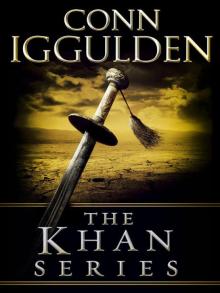 The Khan Series 5-Book Bundle
The Khan Series 5-Book Bundle Tollins 2: Dynamite Tales
Tollins 2: Dynamite Tales Tollins: Explosive Tales for Children
Tollins: Explosive Tales for Children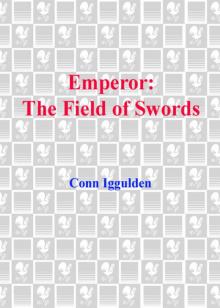 The Field of Swords
The Field of Swords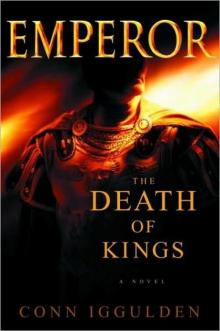 The Death of Kings
The Death of Kings Quantum of Tweed: The Man With the Nissan Micra
Quantum of Tweed: The Man With the Nissan Micra Bones of the Hills
Bones of the Hills Genghis: Birth of an Empire
Genghis: Birth of an Empire The Gates of Rome
The Gates of Rome Dunstan
Dunstan Fig Tree
Fig Tree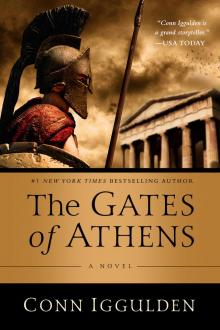 The Gates of Athens
The Gates of Athens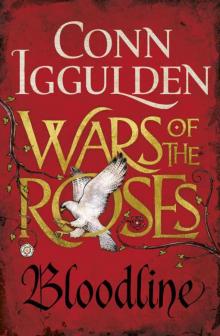 Stormbird
Stormbird Khan: Empire of Silver
Khan: Empire of Silver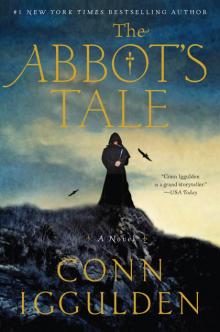 The Abbot's Tale
The Abbot's Tale Gengis: Lords of the Bow
Gengis: Lords of the Bow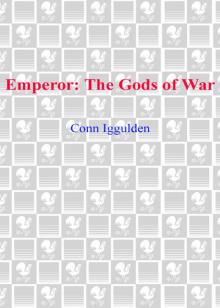 The Gods of War
The Gods of War Blackwater
Blackwater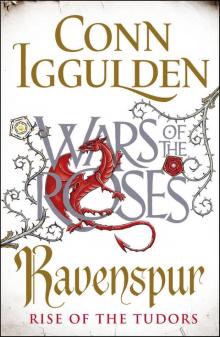 Ravenspur: Rise of the Tudors
Ravenspur: Rise of the Tudors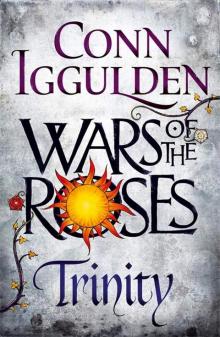 Wars of the Roses: Trinity (War of the Roses Book 2)
Wars of the Roses: Trinity (War of the Roses Book 2) The Gods of war e-4
The Gods of war e-4 The Dangerous Book of Heroes
The Dangerous Book of Heroes Stormbird wotr-1
Stormbird wotr-1 Emperor: The Death of Kings
Emperor: The Death of Kings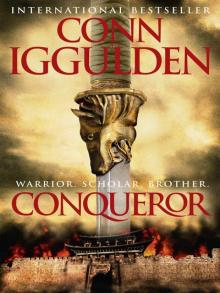 Conqueror (2011) c-5
Conqueror (2011) c-5 The Dangerous Book for Boys
The Dangerous Book for Boys Genghis Lords of the Bow
Genghis Lords of the Bow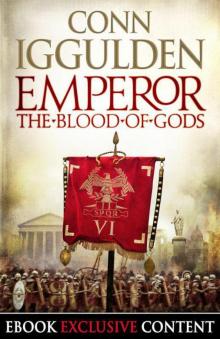 Emperor: The Blood of Gods (Special Edition) (Emperor Series, Book 5)
Emperor: The Blood of Gods (Special Edition) (Emperor Series, Book 5) The Emperor Series: Books 1-5
The Emperor Series: Books 1-5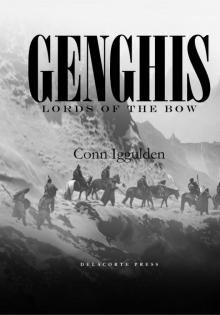 Lords of the Bow c-2
Lords of the Bow c-2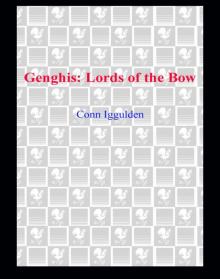 Lords of the Bow
Lords of the Bow Quantum of Tweed
Quantum of Tweed Wars of the Roses 01 - Stormbird
Wars of the Roses 01 - Stormbird Empire of Silver c-4
Empire of Silver c-4 Birth of an Empire
Birth of an Empire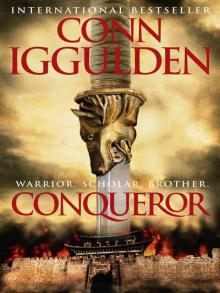 Conqueror (2011)
Conqueror (2011)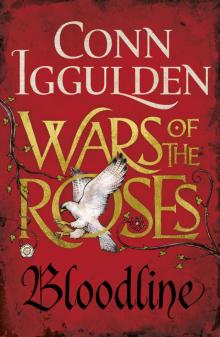 Wars of the Roses: Bloodline: Book 3 (The Wars of the Roses)
Wars of the Roses: Bloodline: Book 3 (The Wars of the Roses) Bones Of the Hills c-3
Bones Of the Hills c-3 Empire of Silver
Empire of Silver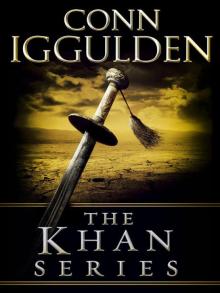 The Khan Series 5-Book Bundle: Genghis: Birth of an Empire, Genghis: Bones of the Hills, Genghis: Lords of the Bow, Khan: Empire of Silver, Conqueror
The Khan Series 5-Book Bundle: Genghis: Birth of an Empire, Genghis: Bones of the Hills, Genghis: Lords of the Bow, Khan: Empire of Silver, Conqueror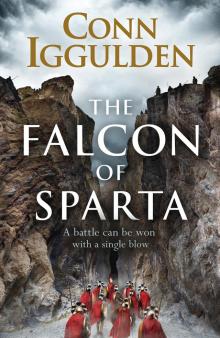 The Falcon of Sparta
The Falcon of Sparta Explosive Tales for Children
Explosive Tales for Children